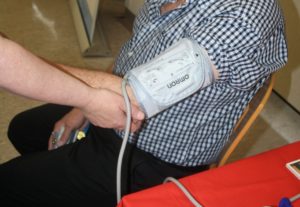 New research has found that long-term exposure to high blood pressure is associated with an increased risk of aortic valve disease, with significant implications for clinical practice guidelines and health management.
New research has found that long-term exposure to high blood pressure is associated with an increased risk of aortic valve disease, with significant implications for clinical practice guidelines and health management.
The findings, published in the European Heart Journal, are from a study of 5.4 million adults in the UK, led by The George Institute for Global Health at the University of Oxford, and supported by the National Institute for Health Research Oxford Biomedical Research Centre.
Deputy Director of The George Institute UK, Prof Kazem Rahimi, said: “Aortic valve disease (AVD) typically emerges in later adulthood, and in the absence of any known tools for its prevention, we have been thinking of it as a disease of old age that we can do little about.”
“Clinical practice guidelines currently make little reference to preventative strategies, but this study suggests high blood pressure should be considered a major risk factor for aortic valve disease, much as it is for heart attacks, stroke and other cardiovascular diseases,” said Prof Rahimi, who led the research study.
The findings show that each 20 mmHg (millimeter of mercury) increase in systolic blood pressure is linked to a 41% greater risk of developing aortic stenosis, a condition in which the valve that controls how blood is pumped from the heart to the main artery doesn’t open fully.
People with a systolic blood pressure of 161 mmHg or more were twice as likely to be diagnosed with the condition as those with a systolic blood pressure of 120 mmHg or lower.
Higher blood pressure is also linked to a greater risk of aortic regurgitation, when the aortic valve doesn’t close properly and blood leaks back into the heart. Each 20 mmHg increase in systolic blood pressure is linked to a 38% greater risk of developing this condition.
Patients with aortic valve disease may suffer symptoms such as chest pain, shortness of breath, fatigue, fainting and dizziness.
The new research provides further evidence of the importance of controlling hypertension, and has significant implications for health guidelines and clinical practice.
Dr Stefano Masi from the Department of Clinical and Experimental Medicine at the Università di Pisa, Italy, and Dr Alberto Giannoni from the Fondazione Toscana Gabriele Monasterio, Pisa, commented in an editorial that the study “provides the first solid evidence supporting the need for a radical shift in the approach to AVD”, and that it “might stimulate new lines of research, particularly imaging studies, with the scope of identifying early alterations of the aortic valve in patients with hypertension that might be highly predictive of future AVD.”
While the study suggests that the association between higher blood pressure and a greater risk of aortic valve disease is causal, further investigation is needed to explore why this may be the case, in particular whether raised blood pressure may be an indication of an underlying problem with stiffness in the aortic valve that is caused by something else.